
The Pakistan Muslim League (N) (PML(N) or PML-N; Urdu: پاکستان مسلم لیگ (ن)) is a centre-right, conservative liberal political party in Pakistan. It is currently the third-largest party in the Senate and the largest in the National Assembly. The party was founded in 1993, when a number of prominent conservative politicians in the country joined hands after the dissolution of Islamic Democratic Alliance, under the leadership of former Prime Minister Nawaz Sharif. The party's platform is generally conservative, which involves supporting free markets, deregulation, lower taxes and private ownership. Although the party historically supported social conservatism, in recent years, the party's political ideology and platform has become more liberal on social and cultural issues; however, members have been accused of using Islamist populist rhetoric. Alongside the Pakistan Tehreek-e-Insaf (PTI) and Pakistan People's Party (PPP), it is one of the three major political parties of the country.
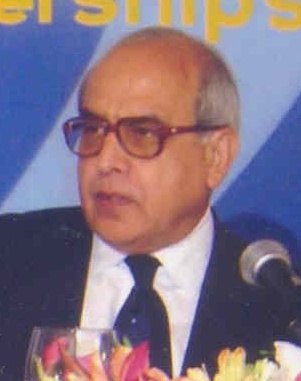
Farooq Ahmad Khan Leghari, was a Pakistani politician who served as the eighth president of Pakistan from 14 November 1993 until resigning on 2 December 1997. He was the first Baloch to be elected as President.

Ghulam Mustafa Jatoi was a Pakistani politician who served as the Caretaker Prime Minister of Pakistan for three months, from 6 August 1990 to 6 November 1990.

Since its establishment in 1947, Pakistan has had a non-symmetric federal government and is a federal parliamentary democratic republic. At the national level, the people of Pakistan elect a bicameral legislature, the Parliament of Pakistan. The parliament consists of a lower house called the National Assembly, which is elected directly via first-past-the-post voting, and an upper house called the Senate, whose members are chosen by elected provincial legislators. The head of government, the Prime Minister, is elected by the majority members of the National Assembly and the head of state, the President, is elected by the Electoral College, which consists of both houses of Parliament together with the four provincial assemblies. In addition to the national parliament and the provincial assemblies, Pakistan also has more than five thousand elected local governments.

Chaudhry Parvez Elahi Warraich is a Pakistani politician who is the former Chief Minister of Punjab. He was a member of the Provincial Assembly of the Punjab from August 2018 till January 2023, when he, as chief minister, dissolved the assembly. In 2023, he left the Pakistan Muslim League (Q) and joined Pakistan Tehreek-e-Insaf (PTI) along with his son, Moonis Elahi, and 10 other former PML(Q) MPAs over political rifts with the party president and cousin, Chaudhry Shujaat Hussain. He was appointed president of the PTI. He was the former president of the Punjab Division of the PML(Q).
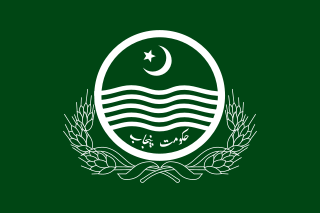
The Provincial Assembly of the Punjab is a unicameral legislature of elected representatives of the Pakistani province of Punjab, which is located in Lahore, the provincial capital. It was established under Article 106 of the Constitution of Pakistan, having a total of 371 seats, with 297 general seats, 66 seats reserved for women and 8 reserved for non-Muslims.

Mian Muhammad Shehbaz Sharif is a Pakistani politician and businessman who is currently serving as the 23rd prime minister of Pakistan since March 2024, having previously served in the post from April 2022 to August 2023. He has also served as the president of the Pakistan Muslim League (N) (PML-N). Previously in his political career, he served as the chief minister of Punjab three times, making him the longest-serving chief minister of Punjab.
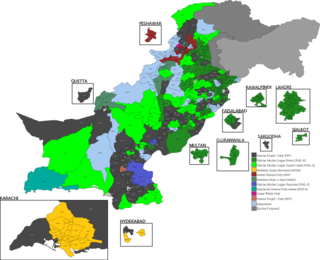
General elections were held in Pakistan on 18 February 2008 to elect members of the 13th National Assembly and the four Provincial Assemblies.

General elections were held in Pakistan on 7 December 1970 to elect members of the National Assembly. They were the first direct general elections since the independence of Pakistan and ultimately the only ones held prior to the independence of Bangladesh. Voting took place in 300 general constituencies, of which 162 were in East Pakistan and 138 in West Pakistan. A further thirteen seats were reserved for women, who were to be elected by members of the National Assembly.
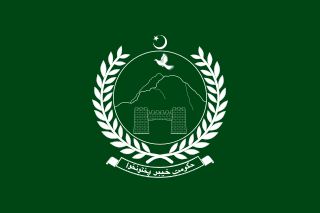
The Provincial Assembly ofKhyber Pakhtunkhwa is a unicameral legislature of elected representatives of the Pakistani province of Khyber Pakhtunkhwa, which is located in Peshawar, the provincial capital. It was established under Article 106 of the Constitution of Pakistan, having a total of 145 seats, with 115 general seats, 26 seats reserved for women and 4 reserved for non-Muslims.

The Governor of Balochistan is the head of the province of Balochistan, Pakistan. The post was established on 1 July 1970, after the dissolution of West Pakistan province and the end of One Unit. Under Pakistan's current parliamentary system, the governorship is a ceremonial position, as a symbol of the federation. The governor is appointed by the centre, whereas the principal head of the provincial government remains the elected Chief Minister of Balochistan.
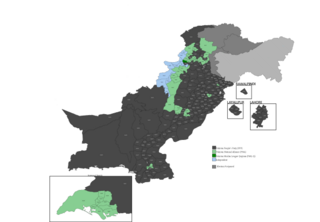
General elections were held in Pakistan on 7 March 1977 to elect 200 members of the National Assembly. They were the second general elections held in Pakistan and the first to be held after the Bangladesh Liberation War.

General elections were held in Pakistan on 3 February 1997 to elect the members of National Assembly. The elections were a fierce contest between Pakistan Peoples Party (PPP) led by pre-election Prime Minister Benazir Bhutto and the Pakistan Muslim League (N) led by Nawaz Sharif. Unlike the 1990 elections where Sharif won due to allegations of rigging, this time he benefited from the controversial death of Bhutto's brother Murtaza, a populist leader, a worsening economy, and alleged corruption cases against Bhutto's husband Asif Ali Zardari.

General elections were held in Pakistan on 6 October 1993 to elect the members of National Assembly. The elections took place after both the Prime Minister Nawaz Sharif and President Ghulam Ishaq Khan resigned to resolve a power struggle.

Shafqat Mahmood is a Pakistani bureaucrat-turned-politician who served as the Federal Minister for Federal Education and Professional Training, and Federal Minister for National History and Literary Heritage, from 20 August 2018 to 3 April 2022. Before going into politics, he served as a grade 20 officer of the Pakistan Administrative Service.
Chaudhry Tariq Bashir Cheema is a Pakistani politician who is serving as the Secretary General of the PML-Q since 2003. He has been a member of the National Assembly of Pakistan since February 2024 and previously served in this position from August 2018 till August 2023 and from June 2013 till May 2018. He served as the Federal Minister for National Food Security and Research.

Provincial elections were held in the Pakistani province of Punjab on to elect the members of the 17th Provincial Assembly of the Punjab on 25 July 2018, alongside nationwide general elections and three other provincial elections in Sindh, Balochistan and Khyber Pakhtunkhwa. The remaining two territories of Pakistan, AJK and Gilgit-Baltistan, were ineligible to vote due to their disputed status.
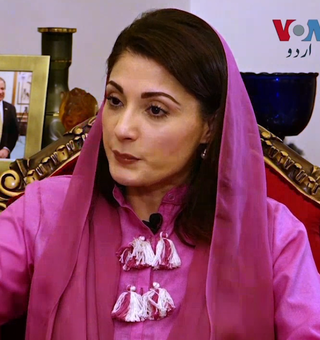
Provincial elections were held in the Pakistani province of Punjab on 8 February 2024 to elect a new provincial legislature. On 5 August 2023, the results of the 2023 digital census were approved by the Council of Common Interests headed by Prime Minister Shehbaz Sharif. Therefore, elections have been delayed for several months, as new delimitations will be published on 14 December 2023, as announced by the Election Commission of Pakistan (ECP). On 2 November 2023, the ECP announced, in agreement with the President of Pakistan, Arif Alvi, that the elections will be held on 8 February 2024. The election was held concurrently with nationwide general elections and other provincial elections.

The first Benazir Bhutto government was formed on 2 December 1988 following general elections held in 1988. Due to the PPP only securing a plurality, the new government forged a coalition alliance with the MQM, ANP, JUI(FR) and other additional independents. Following elections President Ghulam Ishaq Khan called upon Benazir Bhutto, later announcing the formation of a new government. Benazir promised while taking oath on 2 December to eradicate illiteracy, poverty, restore student unions, liberate political prisoners, provide equal rights to women and free the media. However, the Army's continued influence and lack of a legislative majority led to her later declaring her government's freedom of action was "institutionally, economically, politically (and) structurally" constrained. Later during Presidential elections the same year, Benazir Bhutto solidified her alliance with President Ishaq Khan through supporting his bid for re-election. However later the two came into conflict, over the division of powers between the two offices and as the President continued to support Bhutto's opponent Nawaz Sharif. Eventually on 6 August 1990 Ghulam Ishaq Khan issued an order under Article 58(2)(b) dissolving the National Assembly causing the Prime Minister and the cabinet to cease holding office. The stated charges of dismissal for the Bhutto government were corruption and the deteriorating law and order situation in Sindh.

The Jatoi caretaker government was the first caretaker government in Pakistan from 6 August 1990 to 6 November 1990. Ghulam Mustafa Jatoi acted as the first caretaker Prime Minister of Pakistan. The Jatoi government was appointed by Ghulam Ishaq Khan, who was president, after he dissolved the National Assembly and the PPP Bhutto government in August of the same year. Jatoi previously served as leader of the opposition in the assembly, whilst other caretaker ministers were selected based on their opposition to the PPP. Jatoi himself was a former Pakistan People's Party member who formed his own rival National Peoples Party (NPP) after a dispute with Benazir Bhutto. The caretaker government consisted of anti-PPP ministers in the provinces as-well. Ghulam Haider Wyne, an ally of Nawaz Sharif, was caretaker CM while in Sindh, caretaker CM Jam Sadiq Ali also opposed the PPP. Later Jam Sadiq Ali continued in office as Chief Minister following elections.



















